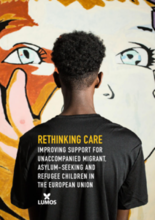Displaying 31 - 40 of 114
In this paper, after a historical introduction, the authors will refer, from a general point of view, to the current moment of immigration witnessed in Spain offering not only statistical data regarding this phenomenon but also legislation, and description of the policies carried out by the central and regional governments on issues like immigration, asylum and integration, with a particular focus on unaccompanied minors.
FICE Israel decided to initiate a short survey to document and share information about the way different countries handled their policies and practices in residential care facilities during that period. This report presents findings and some conclusions from this primary survey.
This study aims at comparing subjective well-being (SWB) of children in residential care and in foster families in two European territories or jurisdictions: Portugal and Catalonia (Spain).
There has recently been increased interest in the potential for formal and informal networks to aid interventions with biological families in helping them achieve reunification in the context of the child protection system. This article analyzes the conceptualization of social support in order to create social support networks.
The present study aimed to evaluate the specific impact of different forms of victimization on alcohol and cannabis use problems among adolescents in Residential Child Care (RCC) in Spain, attending to sex differences.
This report maps and assesses the forms of care provided to unaccompanied migrant, asylum-seeking and refugee children in six European Union Member States: Bulgaria, France, Italy, Greece, the Netherlands and Spain.
This review aims to provide social workers with a resource to guide their decision‐making by evaluating both the benefits and risks associated with open adoption.
The goal of this study is to analyze the profile of 353 adolescents in TRC in Spain.
The aims of this article were to identify the types and characteristics of social support for families in vulnerable situations and to analyze what elements influence families’ attitudes towards these supports.
In this study, autobiographical memory tests, working memory, and a depressive symptom assessment were administered to 48 adolescents in care with a history of maltreatment (22 abused and 26 neglected) without mental disorder, who had been removed from their family and were living in residential child care, and to 61 adolescents nonmaltreated who had never been placed in care.



